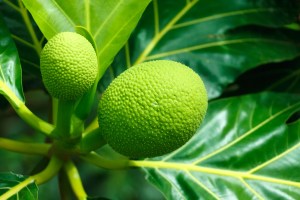The macadamia nut tree out the back of my place is flowering and is covered with long, yellow flower spikes. In a few months it will be covered in nuts. However, in world markets right now there is a shortage of whole macadamia nut kernels. While stocks remain scarce, macadamia products are at increased risk of fraudulent activity. Whole kernels are less likely than other macadamia products to be affected by fraudulent adulteration, however they are still at risk of fraudulent misrepresentation of country of origin, packing date and organic status. Nut pieces, meals and flours are at risk of fraudulent adulteration with cheaper fillers and substitutes.
Here are some other interesting issues in food fraud or potential food fraud from the last month:
Are breadfruit products an emerging fraud risk? Breadfruit is a starchy tropical fruit that grows on large trees in the Pacific Islands and the Caribbean. Breadfruit flour is said to have huge potential as a gluten-free product and breadfruit could become the next ‘superfood’, but right now demand outstrips supply and new trees take 3 to 5 years to bear fruit. If the marketing gurus succeed in making breadfruit the next big thing, it will attract a premium price in North America and Europe and gluten-free breadfruit flour could become an attractive target for fraud. I will be watching this product closely to see how the situation develops.

Hairy crabs, a delicacy in parts of China, are in season now, with crabs from particular lakes being very highly prized and even more expensive than their counterparts from other lakes. A crab-marketing group representing hunters from Yangcheng lake designed an anti-counterfeiting system based on bar-code technology for Yangcheng crabs. Unfortunately, they discovered that sellers of crabs from other lakes were forging the anti-fraud bar-codes. I predict this type of fraud to increase over the next few years as consumers come to expect and trust anti-counterfeit measures applied to expensive consumer items.
For more on these topics plus expert analysis of the food fraud risk profiles of hundreds of other food materials check out our food fraud risk information database.